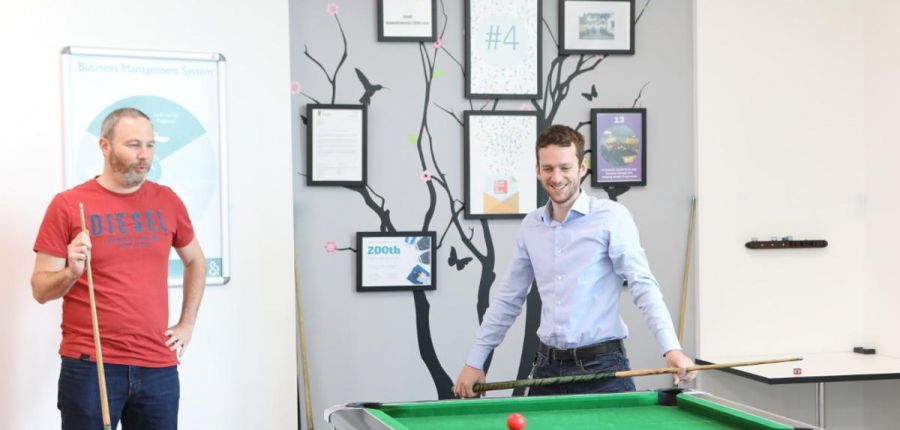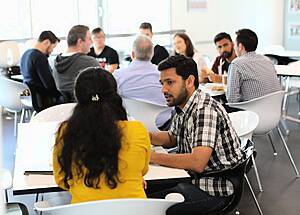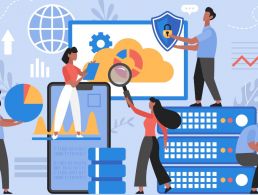Thinking about a career in data science but not sure where to start? Check out these tips from those already working in the field.
As we heard from Anaplan’s Tal Sergalov, “being a data scientist doesn’t mean sitting alone with your computer all day”.
So, what does it mean? And what are the skills you might need to carve out a successful career in this field? For Data Science Week at Siliconrepublic.com, we heard from a variety of experts in the area to bring you some valuable inside knowledge.
Speak to the experts
When it comes to job-seeking and upskilling, you might think that specialising and narrowing your skillset is the best option. But that’s not always the case, according to Steve Flinter, director of AI practice at Mastercard. He believes that bringing disciplines together under one skillset is a massive advantage.
“Data scientists tend to come from one of two backgrounds: computer science or a non-computer science numerate discipline, such as maths, stats, engineering or physics,” he said.
“My advice to computer science graduates would be to strengthen your maths and stats knowledge, as that area is often a weakness. Equally, for non-computer science graduates, my advice would to be strengthen your software engineering skills.
“A data scientist that has both excellent maths and stats skills and software engineering skills is very powerful.”
Flinter also advised that data scientist should learn as much as they can about what they’re working on.
“Don’t underestimate the importance of understanding the domain that you’re trying to model. The answers are not always in the data – speaking to experts in the field to understand how it works and how they make decisions, for example, is hugely important.
“Very often, a lot of their implicit knowledge is never recorded anywhere and is not easy to discover from data alone.”
A combination of careers
The concept of combining different disciplines is something Eoin Lane, senior consultant in advanced analytics at Dun & Bradstreet, agreed with.
“Being a data scientist is an interesting and challenging career. The core ideas have been around since the birth of computing, with the Turing machine used by the Allies to read encrypted German messages during World War two, but the modern resurgence can often be traced back to the publication of Money Ball, a book detailing how analytics propelled a struggling US baseball team to the World Series.
“Today, data science is mostly focused on big data and it really a combination of two careers: technology and analytics, so it helps to know a bit about both.”
Lane also offered some further insight into the technical requirements for a job in data science.
“From the technology side, it’s useful to know the well-known and well-understood big data architectures such as Twitter, Facebook, and Instagram, among others. Aspiring data scientists should then understand the technical constructs that are needed to build these big data architectures eg hashmaps, linked lists, stacks, queue, graphs etc. Learning to program in Python is certainly a huge help.”
Hoping to prepare for success in the field? Lane also gave some advice on where to start looking.
“There are great courses on Udemy as well as sites like Kaggle where you can get access to data sets and enter data science competitions. Doing well in one of these competitions will get you noticed, so get coding!”
Future-proofing
According to Steph Locke of Locke Data, future-proofing your skills is key to ensuring a solid foundation.
Her advice is to keep your finger on the pulse of newer techniques around deep learning and reinforcement learning, because these are the aspects helping her team to work on unstructured data, such as video and images.
“Then from the machine learning side, have your business data – like the data everyone has about how tweets are performing, who your customers are and what your processes are doing. That data is here to stay. That data is never going to go away. It doesn’t matter what industry you work in,” she added.
The lesser-known skills
Some of the skills needed to achieve success in data science may be obvious, such as a sound understanding of technology and a passion for working with numbers. But what about the others that don’t necessarily come to mind?
Jennifer Cruise, head of data science at Aon’s Centre for Innovation and Analytics (ACIA), is excited for what data science will mean for insurance in the future.
But she also said that soft skills such as creative thinking are important for people working in this sector. In particular, she highlighted people “using creativity in how they approach a problem, but then fusing that creative thinking with logic and data science and machine learning”.
“The most rewarding thing for me is working with people who genuinely get a kick out of solving problems and watching all the different skillsets at play.”










